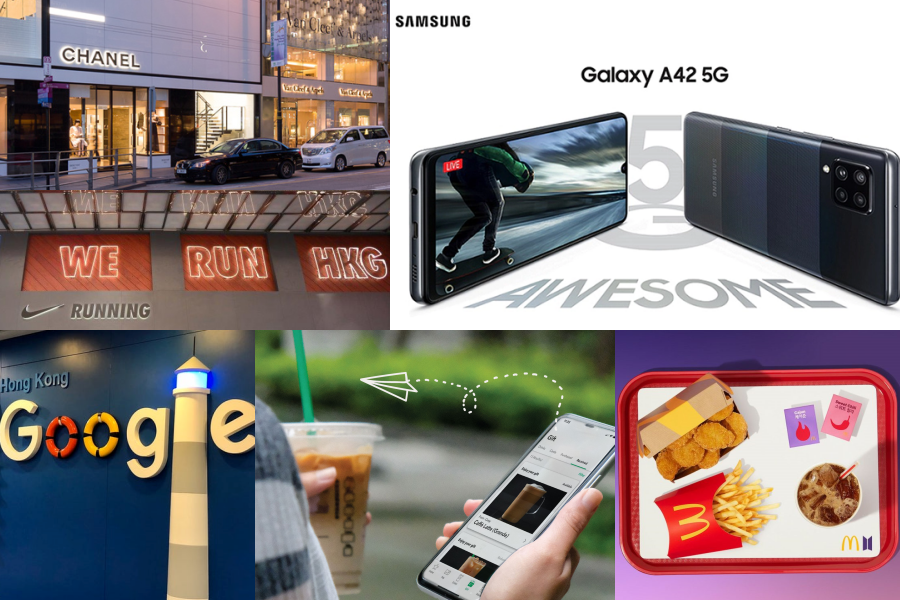Last year, Hong Kong's top 100 brands list mostly remained steady. However, in 2021, the top 100 part of our Asia's Top 1000 Brands research experienced dramatic changes. At least 17 new entrants moved into the Hong Kong top 100 this year.
Though the top five remain relatively stable, three brands (Nestle, Watsons, and Meiji) fell out of the top 10, replaced by Google, Johnson & Johnson and Nike.
Among the top 10, Samsung, number one in the overall Asia's Top 1000 Brands list, tops the Hong Kong ranking again this year, and Panasonic beats out Apple for second place. Sony and Chanel are in the same places, fourth and fifth, for the third consecutive year. Hitachi and Philips moved up, while Nestle and Meiji dropped slightly to 13th (-7) and 14th (-4), respectively.
Watsons made the biggest drop in the top echelon of the list, falling 12 spots to 20th. This mirrors the brand's performance in the overall Asia’s Top 1000 brands list, where it dropped from 34th to 68th—its worst ranking since 2013. Under Watsons’ parent company Hutchison Whampoa, ParknShop, another retail brand, kept the same ranking (47th) this year.

Meanwhile, brands under Dairy Farm, rebranded as the DFI Retail Group this year, have risen rapidly: Manning's rose 32 spots to 21st, Wellcome climbed 10 to 48th, 7-Eleven improved 10 to 39th, Maxims rose 11 to 81st and Ikea Hong Kong moved up four to 17th. The ranking of the parent company, Dairy Farm, dropped to 112th (-22).
SK-II’s purpose-driven campaigns seemed to work well in Hong Kong and the whole of the Greater China region; the brand rose 53 positions to 91st this year in Hong Kong, echoing its 30-spot rise to 90th on the mainland China top 100 list.
Turning to financial services, while HSBC (15th, +2) and Bank of China (92nd, +43) improved, Standard Chartered Bank and Hang Seng Bank fell out of the top 100.
Coca-Cola's brands dropped sharply: Coca-Cola itself fell from 12th to 41st and Bonaqua exited the top 100.
Digital transformation on mobile
Numerous brands have been forced through accelerated digital transformation due to the pandemic. Starting from improving customer experience on mobile apps to promoting membership programmes, McDonald's Hong Kong, which rose nine spots to 34th, and Starbucks Hong Kong (up 18 to 12th) stood out from other restaurant chains.
McDonald's Hong Kong relaunched its mobile app last year and attracted more than 2 million people in Hong Kong to register. With the mobile app as a unique channel, McDonald also launched numerous campaigns, including the BTS meal.
What’s more, the click-and-collect function from the mobile apps accelerated the process of digitalisation for the two brands.
Over the past two years, Starbucks not only frequently launched marketing campaigns on its mobile app but also promoted more localised food and beverage selections, selling a more unique customer experience.
Royce Yuen, co-CEO of MaLogic and visiting associate professor at the University of Hong Kong Business School, analysed the “magical transformation” of Starbucks in two aspects. Firstly, Starbucks “is a brand recognised as truly international, but it seizes every opportunity to immerse into the local community.” He mentions special festive foods like mooncakes and special coffee-plus-tea beverages invented by Hong Kong locals. “Hong Kong is the only place in the world that you can order a cup of Yinyeung, which is the local favorite of mixing coffee with English tea,” Yuen says. Secondly, Starbucks “is a brand that gives you the physical kick (with the caffeine in coffee) and also a mental lift (the emotional feeling of refreshment),” Yuen adds.
Delivery apps and the pandemic fundamentally changed the situation of the catering and restaurant business. Big brands created their own mobile apps for online ordering. More restaurants are joining food-delivery networks.
Deliveroo (27th) and Foodpanda (28th), joined the Hong Kong top 100 brand list for the first time. While this is because we added a category for delivery services for the first time, the inroads the two brands have made in Hong Kong can't be denied. Both have localised their strategies, working closely with local restaurants and grocery providers in Hong Kong to win the hearts of consumers. Uber Eats, another food delivery app, ranks at 147th. All of them launched localisation campaigns in Hong Kong over the past year.
Social media transforms branding
Some social-media apps are rising (WeChat, up nine to 29th, and Instagram, up 21 to 72nd) while others are dropping (WhatsApp, down 10 to 35th and Facebook, down 43 to 82nd).
All these social-media apps are now evolving from personal sharing platforms to powerful tools for social-media marketing, providing potential opportunities for marketers in the near future.
Regarding social-media marketing, Yuen remarks that marketers “have to adopt a new way of presenting their brands in a much more natural setting so that the consumers will be willing to embrace the brands. This will require a new way of storytelling that is authentic, attractive, aspirational and entertaining.”
Online gaming experienced exponential growth in most parts of the world. Part of the reason could be attributed to the community contribution of gaming and the authentic marketing from content creators to KOLs.
For the Hong Kong market, video games, game console and streaming-media brands, such as Sony Playstation (63,+38), Nintendo Switch (76,+51), Netflix (77, +39), gained places because of the lockdown, travel restrictions and social distancing after the pandemic.














